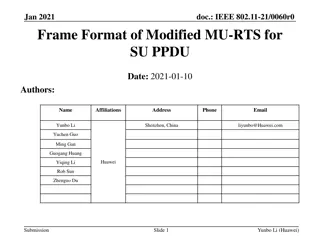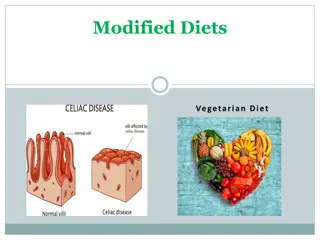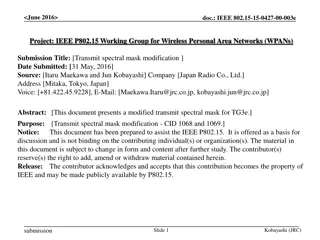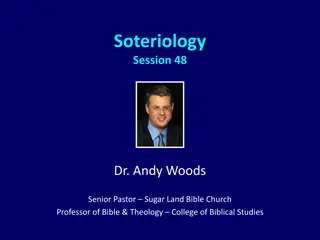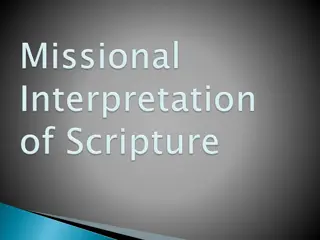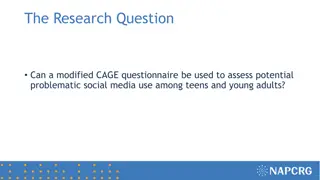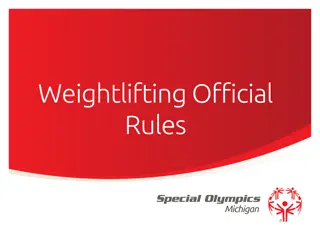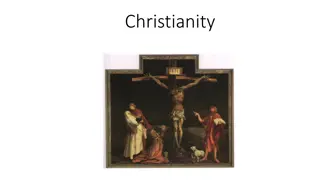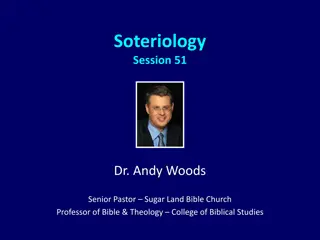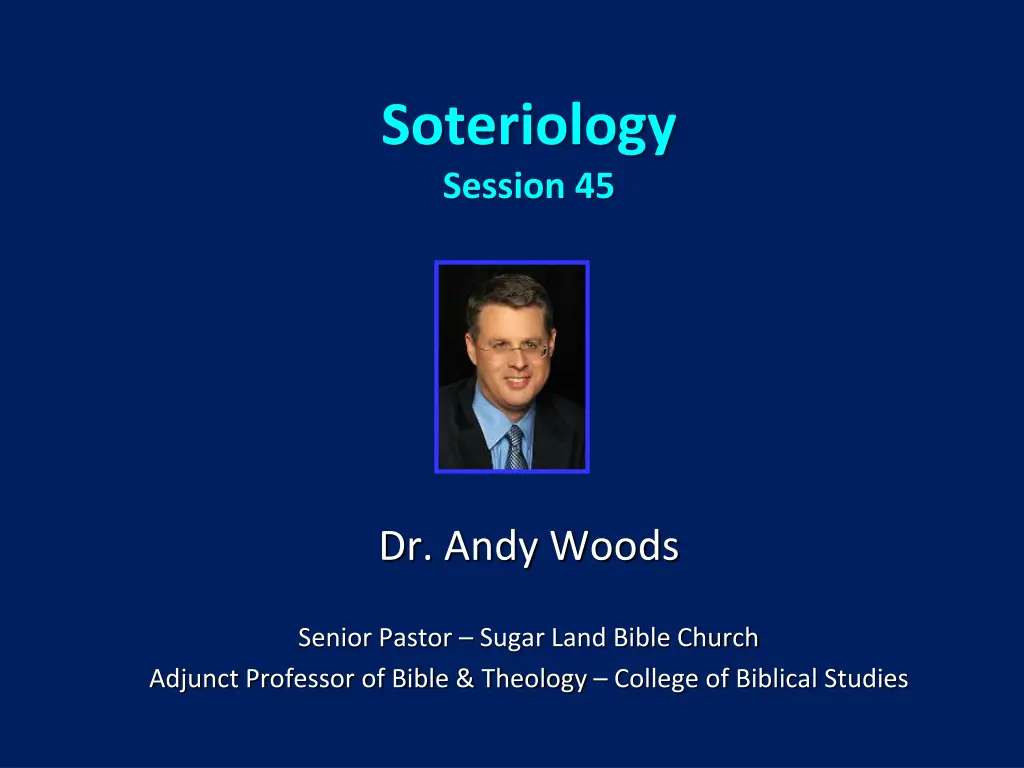
Understanding the Epistle to the Hebrews: Superiority of Christ's Revelation
Delve into the Book of Hebrews, exploring its purpose, message, and warnings against lapsing back into Judaism. Discover how Christ's superiority is highlighted over Judaism's vestiges like angels, Moses, and the Aaronic priesthood.
Download Presentation

Please find below an Image/Link to download the presentation.
The content on the website is provided AS IS for your information and personal use only. It may not be sold, licensed, or shared on other websites without obtaining consent from the author. If you encounter any issues during the download, it is possible that the publisher has removed the file from their server.
You are allowed to download the files provided on this website for personal or commercial use, subject to the condition that they are used lawfully. All files are the property of their respective owners.
The content on the website is provided AS IS for your information and personal use only. It may not be sold, licensed, or shared on other websites without obtaining consent from the author.
E N D
Presentation Transcript
Soteriology Session 45 Dr. Andy Woods Senior Pastor Sugar Land Bible Church Adjunct Professor of Bible & Theology College of Biblical Studies
Occasion of Hebrews A.D. 70 Acts 2:40 Heb. 3:1 (Christian confession) Unbelieving Jews placing audience under duress to return to Judaism Second generation (Heb. 2:3-4) Audience being worn down Temple still standing (Heb. 8:4, 13; 9:6; 10:1-2; 13:10)
Purpose of Hebrews Encouragement / motivation to not lapse back into Judaism What believers already have in Christ is superior to every vestige of Judaism (Angels, Moses, and the Aaronic priesthood) Warnings
Message of Hebrews The superiority of the full revelation of Christ in comparison to OT Judaism is shown through Christ s superiority to every major vestige of Judaism
Outline of Hebrews I. Doctrinal section (1:1 10:18) A. Christ s attributes (1:1-3) B. Christ is superior to the angels (1:4 2:18) C. Christ is superior to Moses (3:1 4:13) D. Christ is superior to Aaron (4:14 10:18) II. Practical section (10:19 13:25) A. Exhortations and pastoral reminders (10, 12, 13) B. Hall of faith (11) C. Benediction (13:20-25)
Parenthetical Warnings Throughout Hebrews 2:1-4 Warning against drifting 3:7-4:13 Warning against disobedience 5:10-6:20 Warning against immaturity 10:26-39 Warning against despising the truth 12:25-29 Warning against denying the truth
4 Views on Warning Passages Calvinism/Reformed Arminianism Hypothetical Loss of blessings
4 Views on Warning Passages Calvinism/Reformed Arminianism Hypothetical Loss of blessings
Kadesh Barnea Paradigm Kadesh Barnea Hebrews Source of fear: Giants Unbelieving Jews Do not lapse back into Judaism Disobedience: Occupy Canaan Loss of maturity; divine discipline Consequence: Loss of Canaan
The Kadesh Barnea Paradigm as a Solution to the Problem of Hebrews 6:4-6 I. The Exodus Generation A. Believing status B. Loss of Canaan II. The Hebrews A. Believing status B. Loss of blessings III.Inadequate alternatives A. Calvinism/Reformed B. Arminianism C. Hypothetical
Parenthetical Warnings Throughout Hebrews 2:1-4 Warning against drifting 3:7-4:13 Warning against disobedience 5:10-6:20 Warning against immaturity 10:26-39 Warning against despising the truth 12:25-29 Warning against denying the truth
Warning Against Drifting (2:1-4) Parenthesis in argument about angels (1:13; 2:5) We (2:1, 3) Us (2:3) Neglect (2:3) From the lesser to the greater (a fortiori) Loss of blessing fellowship, maturity, rewards, discipline (12:5-11) Especially true since the message had been confirmed to the audience through apostolic signs and wonders (2:3-4)
Warnings Throughout Hebrews 2:1-4 Warning against drifting 3:7-4:13 Warning against disobedience 5:10-6:20 Warning against immaturity 10:26-39 Warning against despising the truth 12:25-29 Warning against denying the truth
Warning Against Disobedience (3:74:13) 3:6 if assumes possibility they would not 3:7-11 Ps 95; Numbers 13 14 3:12-19 Forfeited blessings 4:1-13 Rest available Possibility of rest (4:1-2) Pattern of rest (4:3-5) Perpetuity of rest (4:6-10) Exhortation to enter rest (4:11-13)
3 Reasons Why Christ is Superior to Aaron (4:14-16) Heavenly position (4:14) Tested in all ways (4:15) Allows entrance into God s throne room (4:16)
Why Understanding Melchizedek Requires Maturity (5:10) Typology Paucity of OT evidence (Gen 14:18-20; Ps 110:4)
Warnings Throughout Hebrews 2:1-4 Warning against drifting 3:7-4:13 Warning against disobedience 5:10-6:20 Warning against immaturity 10:26-39 Warning against despising the truth 12:25-29 Warning against denying the truth
Warning Against Immaturity (5:11 6:20) Fact of audience s immaturity (5:11-14) Items that must be left behind (6:1-3) Warning (6:4-6) Illustration (6:7-8) Confidence (6:9-12) Certainty of the promise (6:13-20)
Warnings Throughout Hebrews 2:1-4 Warning against drifting 3:7-4:13 Warning against disobedience 5:10-6:20 Warning against immaturity 10:26-39 Warning against despising the truth 12:25-29 Warning against denying the truth
Warning Against Despising (10:26-39) Believers (10:19, 19-25, 26, 29, 32, 34, 35) Temptation to lapse back to escape persecution 26 No power to forgive sins (Matt. 27:50-51; AD 70) 27, 30-31 AD 70 (Luke 19:43-44) 28-29a From the lesser to the greater (a fortiori) 29b Three sins for publicly identifying with the nation that crucified Christ 32-36, 39 Reminder of how their past faith has sustained them 37-38 Follow the admonitions to the remnant in Habakkuk's day (Hab. 2:3)
Warning Against Despising (10:26-39) Believers (10:19, 19-25, 26, 29, 32, 34, 35) Temptation to lapse back to escape persecution 26 No power to forgive sins (Matt. 27:50-51; AD 70) 27, 30-31 AD 70 (Luke 19:43-44) 28-29a From the lesser to the greater (a fortiori) 29b Three sins for publicly identifying with the nation that crucified Christ 32-36, 39 Reminder of how their past faith has sustained them 37-38 Follow the admonitions to the remnant in Habakkuk's day (Hab. 2:3)
Eusebius (A.D. 260-340) Ecclesiastical History, 3.5.3 "But the people of the church in Jerusalem had been commanded by a revelation, vouchsafed to approved men there before the war, to leave the city and to dwell in a certain town of Perea called Pella. And when those that believed in Christ had come thither from Jerusalem, then, as if the royal city of the Jews and the whole land of Judea were entirely destitute of holy men, the judgment of God at length overtook those who had committed such outrages against Christ and his apostles, and totally destroyed that generation of impious men." Epiphanius (De pond. et mens. 15) also records this flight of the Christians to Pella.)
Pella Pella was a town situated beyond the Jordan, in the north of Perea, within the dominions of Herod Agrippa II. The surrounding population was chiefly Gentile. See Pliny V. 18, and Josephus, B. J. III. 3. 3, and I. 4. 8.
Warning Against Despising (10:26-39) Believers (10:19, 19-25, 26, 29, 32, 34, 35) Temptation to lapse back to escape persecution 26 No power to forgive sins (Matt. 27:50-51; AD 70) 27, 30-31 AD 70 (Luke 19:43-44) 28-29a From the lesser to the greater (a fortiori) 29b Three sins for publicly identifying with the nation that crucified Christ 32-36, 39 Reminder of how their past faith has sustained them 37-38 Follow the admonitions to the remnant in Habakkuk's day (Hab. 2:3)
Arnold Fruchtenbaum Israelology, pg. 971-72 The author moves towards giving his fourth warning and begins with a principle for those who reject the truth (10:26)...Now that they have received full knowledge of the truth, if they now willfully choose to apostasize from the faith and once and for all go back into Judaism, there remains no more sacrifice for their sin. The Messiah is the final sacrifice, and if He is rejected, there is no other sacrifice for sin available. Since for the believer all sin is dealt with for eternity, the question is: what is this sin that the cross of the Messiah does not cover in time? In this context, it is a voluntary sin which a believer wills to commit after he has been saved and has been warned of the consequences. It involves a repudiation of one s previous confession of the Messiahship of Jesus.
Arnold Fruchtenbaum Israelology, pg. 971-72 It involves a separation of the believer from other believers permanently and the return to Judaism, the Temple and all that it entails in order to escape persecution The nature of the judgment is threefold: physical death (10:28 29); the A.D. 70 judgment being the time of death (10:25, 27); and the loss of rewards (10:35 36). The Old Testament teaches the fact of judgment (10:28). Under the Law of Moses, one was punished by physical death at the word of two or three witnesses. By the same token, physical death, not spiritual, will fall upon them as well, for punishment is greater under the Law of Christ than under the Law of Moses (10:25).
Arnold Fruchtenbaum Israelology, pg. 971-72 It means treading underfoot the Son of God, and this is a rejection of God the Father who declared Him to be the Son of God. It means considering the blood of the covenant an unholy thing, and this is a rejection of God the Son whose blood it is, because it means to consider the blood of the Messiah no different than the blood of other men, common blood rather than better blood; and in this way implying that Jesus suffered justly for His own sins. It means doing despite unto the Spirit of grace, and this is a rejection of God the Holy Spirit The reason judgment is necessary is because of the character of God (10:30 31). The author quotes from Deuteronomy 32:35 36 (10:30) to show that vengeance is the sole prerogative of God, and that God will judge His people. The author then draws his conclusion (10:31): it is a fearful thing to fall into the hands of the living God. For this reason, they must heed this fourth warning.
Warnings Throughout Hebrews 2:1-4 Warning against drifting 3:7-4:13 Warning against disobedience 5:10-6:20 Warning against immaturity 10:26-39 Warning against despising the truth 12:25-29 Warning against denying the truth
Warning Against Denying (12:25-29) 25 From the lesser to the greater (a fortiori) 26-27, 29 AD 70 28 By contrast they are receiving an unshakeable kingdom No loss of salvation
Warnings Throughout Hebrews 2:1-4 Warning against drifting 3:7-4:13 Warning against disobedience 5:10-6:20 Warning against immaturity 10:26-39 Warning against despising the truth 12:25-29 Warning against denying the truth





